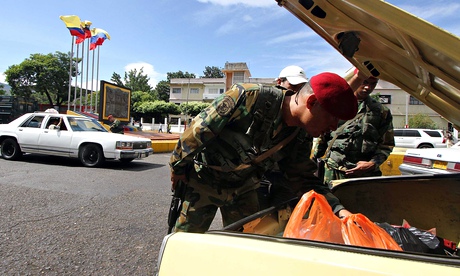
Venezuela's president, Nicolás Maduro, plans to introduce a compulsory "biometric card" designed to limit individuals' food purchases using a fingerprint scanner.
The move, announced on Wednesday, is part of the government's latest effort to fight the oil-rich nation's chronic food shortages, which it claims result from hoarding by speculators, who resell goods at a profit, and from smuggling into neighbouring countries.
This will be the second time the government has introduced a fingerprint-based system to track and limit food purchases. Earlier this year, Venezuelans were encouraged to sign up voluntarily for a similar system to be used in government-run shops, promising to end scarcity of basic food stuffs and ease the queues outside grocery stores. But this Secure Supply Card failed to survive beyond the trial phase.
"We are creating a biometric system … to function in all distribution and retail systems, public and private," Maduro said in a televised address on Wednesday. "This will be – like the fingerprint scan we use in our electoral system – a perfect anti-fraud system." He gave no further details about how the system will work or when it will come into effect.
According to government sources, more than 40% of goods purchased in Venezuela – including medicines and basic food stuff – are smuggled out of the country.
Price controls and heavy subsidies mean goods purchased in Venezuela can often fetch close to four times their original price if taken to neighbouring countries.
Additionally, goods sold across the western border in Colombia mean extra earnings for Venezuelans who upon returning can trade Colombian pesos at the black market rate for a profit.
Smuggling of goods, including petrol, into neighbouring countries has become so widespread that Venezuela recently closed its border with Colombia at night in an attempt to curb the movement of contraband.
But critics claim that closing down the borders or controlling what people buy will do little to end food shortages or to ease an inflation rate that topped 60% in May.
For Henrique Capriles, the leader of the opposition, this new biometric system is nothing more than a Cuban-style rationing card, and a sign that the government's economic model has failed.
"How can you talk about supply when national production is halted? What can you possibly distribute when there is no food?" Capriles asked on Twitter.
Maduro said that some price controls, which have been in place for almost a decade, would be eased. But he did not specify when or how high prices could go.
In the past, Maduro has blamed the country's chronic food shortages and rising inflation on "economic warfare being waged by right-wing factors within the opposition" seeking to oust him from power.
But the government's failure to tackle galloping inflation or end food and medicine shortages has prompted criticism even from within the chavismo ranks – ardent supporters of the left-wing policies of Maduro's predecessor as president, Hugo Chávez.
According to Oscar Schemel, director of Hinterlaces, a local pollster, Maduro's popularity has decreased by 18 points in the last few months, while the country's mood is one of "uncertainty and a highly accentuated discontent".
"We are not talking about rage or of having reached critical mass, but I can say that the government's time [to implement changes] is gone."

